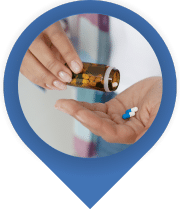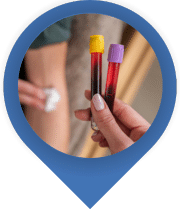The Latest Healthcare News
Check out our blog to learn more from our team about the latest medical advancements, health tips, and primary care news.

At AllCare, we offer a range of treatment options for depression and other mental health conditions. Our experienced team of primary care physicians and behavioral therapists can help identify whether a chemical imbalance in the brain or by life events cause your depression. Once we understand the underlying cause of your symptoms, we’ll work with you to create a personalized treatment plan to help you feel like yourself again.
The World Health Organization estimates that 3.8% of people globally have depression, with about 5% of adults affected and higher rates in women than in men. Adults 60 years and older, pregnant women and new mothers, as well as young people ages 15-29, often struggle with depression.
We understand that depression affects people in different ways, depending on their unique circumstances and challenges. That’s why our approach focuses on personalized care and support, tailored to meet the specific needs of each individual. By recognizing the far-reaching impact of depression, we aim to provide compassionate care that helps people heal, build resilience, and achieve lasting mental well-being.

Depression is a common mental health condition that affects how people feel, think, and behave. Symptoms of depression are not just occasional sadness but a persistent feeling of hopelessness and a loss of interest in activities that once brought you joy. Unlike regular mood changes, depression can profoundly impact all areas of life, including relationships, work, and daily activities. It can make everything feel overwhelming and harder to manage.
Anyone can experience depression, but those who have gone through difficult events such as trauma, loss, or ongoing stress may be more at risk. Women are also more likely to experience depression than men.

Our psychiatry-trained nurse practitioners will evaluate your symptoms and determine the best treatment plan for you. Depending on the treatment plan that you agree upon with your medical provider, medications like antidepressants, anti-anxiety, or other psychiatric medications may be recommended during these visits.

A primary care doctor will review your health history, take your vitals, and discuss your symptoms to determine if life events or a chemical imbalance may be contributing to your depression symptoms.

Our individual therapy sessions provide a safe and confidential space for you to explore your thoughts, emotions, and behaviors. Through personalized counseling, our experienced therapists help you gain self-awareness, develop coping strategies, and navigate life’s challenges to foster personal growth and well-being.

At AllCare, we offer specialized support for individuals dealing with anxiety and depression. Our therapists employ evidence-based techniques to help you manage symptoms, develop healthy coping mechanisms, challenge negative thought patterns, and promote emotional well-being. We provide a compassionate and supportive environment to help you regain control and lead a more fulfilling life.

For more complex cases of depression, we may refer you to a psychologist or psychiatrist to help you manage your depression.

We will schedule follow-up appointments to ensure you are on the right medication dosage and taking them correctly to manage your condition effectively.
Depression often arises from a combination of factors rather than a single cause, and it can vary greatly from person to person. One major factor is brain chemistry imbalances, where levels of neurotransmitters like serotonin, dopamine, or norepinephrine—chemicals that regulate mood and emotions—are disrupted. This imbalance can affect how the brain processes emotions and responds to stress. Other factors contributing to depression are:
Other contributing factors include hormonal changes, such as those experienced during pregnancy, postpartum, or menopause, and certain medical conditions, like thyroid disorders, chronic illnesses, or chronic pain, which can increase the risk of depression.

Experience the convenience of telehealth appointments at AllCare. Our telemedicine services are designed to provide you with seamless access to healthcare without the need to leave your home. Whether you need an online doctor’s appointment for immediate or primary care, AllCare’s got you covered. With our online telehealth services currently available to individuals located in Virginia, Maryland, and Washington, D.C., you can connect with our experienced immediate and primary care physicians via secure video calls.
At AllCare, we are expanding our virtual healthcare access to all services previously offered in person. This includes:
Diagnosing depression in primary care involves a thorough evaluation by a healthcare professional, such as a GP doctor, psychologist, or psychiatrist. The process typically includes:

Getting a diagnosis and starting treatment for your depression is as easy as making an appointment at AllCare. Below are some simple steps for getting treated for depression.
If you are experiencing thoughts of suicide or self-harm, call 911 for immediate medical treatment.
Feeling sad is a natural and temporary response to life’s challenges, such as a loss, disappointment, or difficult situation. It tends to improve as circumstances change or with time. Depression, however, is a persistent mental health condition that goes beyond occasional sadness. It involves a prolonged sense of hopelessness, a lack of interest in activities, and physical symptoms like fatigue, changes in appetite, or sleep disturbances. While sadness is fleeting, depression can interfere with daily life and requires attention and treatment.
Depression often has a genetic component, meaning a family history of the condition can increase your likelihood of experiencing it. However, genetics alone do not determine whether someone will develop depression. Environmental factors, life experiences, and personal coping mechanisms also play significant roles. Even if you are genetically predisposed, lifestyle choices and support systems can greatly influence your mental health outcomes.
Yes, alcohol is classified as a depressant because it slows down the central nervous system, affecting mood regulation and brain function. While it may create a temporary sense of relaxation or euphoria, alcohol can ultimately worsen symptoms of depression by disrupting sleep, impairing decision-making, and increasing feelings of sadness or anxiety over time. For those dealing with depression, reducing or avoiding alcohol can be an important part of recovery.
When speaking to someone with depression, it’s important to express support and understanding. Simple statements like, “I’m here for you, and I want to help however I can,” can provide comfort. Avoid minimizing their feelings or offering overly simple solutions. Instead, acknowledge their struggles with empathy, such as saying, “It’s okay to feel this way, and I want to help you get through it.” Encouraging them to seek professional help is valuable, but the most impactful action you can take is to listen and be present without judgment. Here’s how you can help:
A primary care doctor is often a key resource for addressing depression. They can provide an initial evaluation, discuss your symptoms, and rule out any underlying medical conditions that could contribute to how you’re feeling. They may prescribe antidepressants or recommend therapy and refer you to mental health specialists for further support. Additionally, they can offer guidance on lifestyle adjustments, such as improving sleep, diet, and physical activity, to complement your treatment plan. Regular follow-ups with your doctor ensure that your care is tailored to your progress and needs.
At AllCare, we’re proud to deliver exceptional primary and immediate care to residents across Virginia, Maryland, and Washington D.C.. From bustling city centers to serene suburban neighborhoods, our clinics are strategically placed for your convenience and care. Experience top-tier depression treatment in your community with AllCare, where your health is our priority.
Check out our blog to learn more from our team about the latest medical advancements, health tips, and primary care news.
Seasonal Affective Disorder (SAD) represents a significant mental health concern affecting approximately 5% of adults in the United States. This […]
Read More >Mammograms save lives. Early detection of breast cancer through proper screening will give a patient a remarkable 99% five-year survival […]
Read More >Most people are aware that diet, exercise, and genetics affect cholesterol levels. But can stress raise your cholesterol? The answer […]
Read More >Our related healthcare services extend beyond immediate care to include preventive care such as routine physical exams, chronic disease management for conditions like diabetes, and specialty care referrals for more complex health issues.